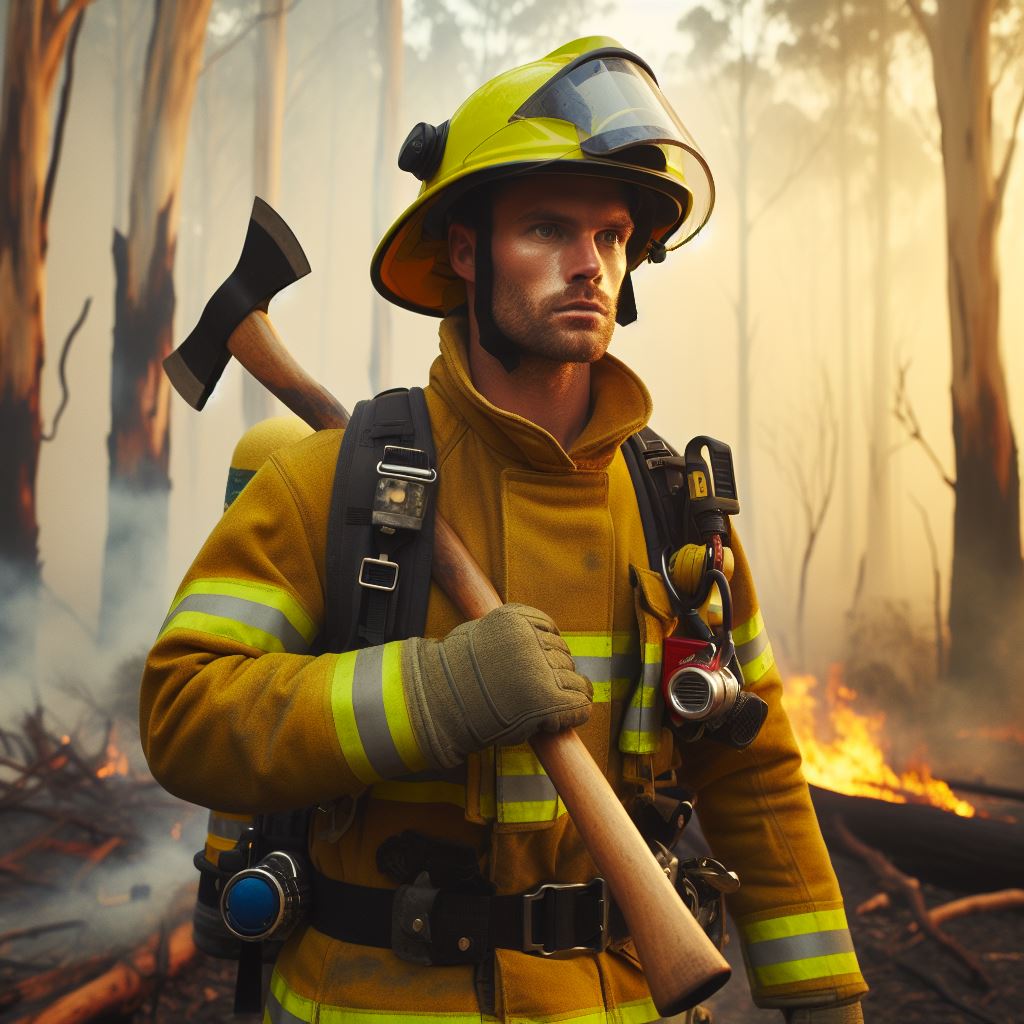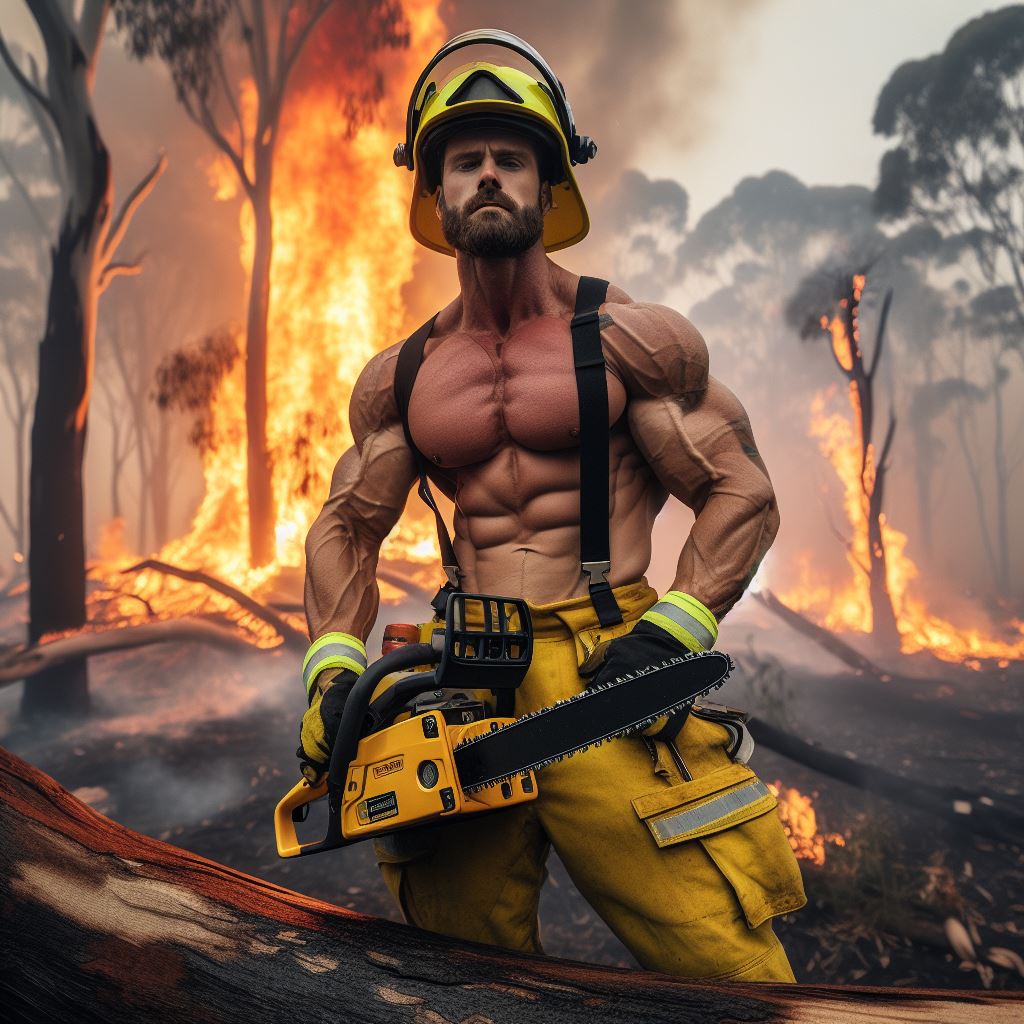Introduction
Amidst the vast and diverse landscapes of Australia, volunteer firefighters stand as a beacon of community resilience. These dedicated individuals, driven by a selfless commitment to their neighbors and surroundings, form an integral part of the firefighting force.
Unlike their professional counterparts, volunteer firefighters are everyday citizens who willingly undergo rigorous training, sacrificing their time and energy to protect communities from the ever-present threat of wildfires and emergencies.
In the intricate tapestry of Australia’s firefighting apparatus, volunteer firefighters weave a crucial thread. Their significance is magnified, particularly in regions where population density is lower, and the challenges of wildfire management are immense.
During crises such as bushfires, these volunteers become the backbone of response efforts, showcasing a depth of commitment that goes beyond professional duty.
Their local knowledge, personal connections, and familiarity with the terrain make them indispensable contributors to the firefighting ecosystem.
In the sections that follow, we will unravel the layers of this vital component of Australia’s firefighting community, exploring the motivations, challenges, and unwavering dedication that define the role of volunteer firefighters in safeguarding the Australian landscape.
Through their actions, these individuals not only protect lives and properties but also exemplify the spirit of solidarity that is essential in confronting the unpredictable forces of nature.
History of Volunteer Firefighters in Australia
Establishment of the first volunteer firefighting brigade
- In 1840, the first volunteer firefighting brigade was established in Sydney, Australia.
- Known as the Sydney Fire Brigade, it consisted of 60 volunteers who were committed to fighting fires.
- These dedicated individuals were willing to risk their lives to protect their communities from devastating fires.
Growth and development of volunteer firefighting over the years
- Throughout the 19th century, volunteer fire brigades began to form in other Australian cities and towns.
- These brigades relied heavily on the selfless efforts of community members who were passionate about fire safety.
- Training and equipment for volunteer firefighters gradually improved, allowing them to better combat fires.
- By the early 20th century, volunteer firefighting became a crucial part of Australia’s overall fire protection system.
- The Country Fire Authority (CFA) was established in Victoria in 1944, marking a significant step forward in volunteer firefighting.
- The CFA’s mission was to provide support and resources to volunteer firefighters across the state.
- Today, the CFA is one of the largest volunteer-based fire services in the world, with over 34,000 active volunteers.
- Volunteer firefighters in Australia are trained to handle a variety of emergencies, including wildfires and structural fires.
- They undergo rigorous training programs, ensuring they are equipped with the necessary skills to save lives and protect property.
- Volunteer firefighters often face dangerous situations, but their commitment to their communities drives their bravery.
More on the Growth and development of volunteer firefighting over the years
- The dedication of these volunteers has been recognized and appreciated by Australians nationwide.
- In recent years, the nation has faced unprecedented challenges due to climate change and an increase in extreme weather events.
- Volunteer firefighters have played a crucial role in responding to and managing these emergency situations.
- They have demonstrated resilience and professionalism as they work tirelessly to keep Australian communities safe.
- Volunteer firefighters are true heroes, standing tall in the face of danger and putting others before themselves.
- Without their selfless efforts, the impact of fires and other emergencies would undoubtedly be more severe.
- The Australian government acknowledges the invaluable contribution of volunteer firefighters and provides support through funding and resources.
- The holistic approach to firefighting in Australia, with the collaboration of professional and volunteer firefighters, ensures effective emergency response.
- The history of volunteer firefighters in Australia is a testament to the strength and unity of the Australian spirit.
- These remarkable individuals embody the values of community, courage, and compassion.
In a nutshell, the history of volunteer firefighters in Australia is a story of sacrifice, dedication, and bravery.
From the establishment of the first brigade in Sydney to the growth of volunteer firefighting organizations across the country, these individuals have continuously stepped up to protect their communities.
Through their training, professionalism, and unwavering commitment, volunteer firefighters have become an integral part of Australia’s fire protection system.
Their contribution cannot be overstated, and their heroism in the face of danger is truly commendable. As Australia continues to face challenging times, the role of volunteer firefighters remains vital in ensuring the safety and well-being of communities nationwide.
Read: Crisis Management in Diplomacy
Recruitment and Training
Requirements to become a volunteer firefighter
- Minimum age of 18 years.
- Physical fitness and good health.
- Completion of basic education or equivalent.
- Willingness to work under challenging and high-stress conditions.
- Commitment to serve the community selflessly.
Training programs and courses for volunteers
- Volunteers undergo comprehensive firefighting training.
- Training covers both theoretical and practical aspects.
- Fire behavior, equipment operation, rescue techniques, and emergency medical training are included.
- Training programs are conducted by experienced firefighters and certified trainers.
- Volunteers learn about fire prevention, hazardous materials, and disaster preparedness.
Importance of ongoing training and skill development
- Ongoing training ensures volunteers are up-to-date with the latest firefighting techniques.
- New equipment, technology, and procedures require continuous education and practice.
- Training helps volunteers maintain their fitness and develop critical decision-making abilities.
- Regular drills and simulations improve coordination and teamwork among volunteer firefighters.
- Continuous skill development prepares volunteers for diverse emergency situations and boosts confidence.
Ultimately, becoming a volunteer firefighter in Australia involves meeting specific requirements and completing rigorous training programs. Ongoing training and skill development are crucial for volunteers to stay up-to-date with the latest firefighting techniques and equipment.
Training not only enhances their capabilities but also fosters teamwork and coordination. Through continuous education and practice, volunteer firefighters are well-prepared to handle diverse emergency situations and serve their communities with utmost dedication.
Read: Day in the Life of an Aussie Police Officer
Responsibilities and Duties
Responding to emergency calls
- Volunteer firefighters play a crucial role in responding to emergency calls in Australia.
- They are always ready to go, 24/7, to provide aid and support during emergencies.
- Whether it’s a structure fire, a medical emergency, or a car accident, they are there to help.
- They risk their lives to save others and ensure the safety of their communities.
- Volunteer firefighters are the first ones on the scene, providing immediate assistance and support.
Wildfire control and prevention efforts
- Australia is prone to devastating wildfires, and volunteer firefighters actively participate in controlling and preventing them.
- They undergo rigorous training to become skilled in wildfire management techniques.
- When a wildfire occurs, volunteer firefighters work tirelessly to contain and extinguish the flames.
- They use their expertise to protect lives, properties, and the environment from the destructive power of wildfires.
- These brave individuals are on the front lines, battling against the forces of nature to keep their communities safe.
Community education and awareness programs
- Volunteer firefighters also play an essential role in community education and awareness programs.
- They actively engage with the public to educate them on fire safety practices and prevention strategies.
- They conduct workshops, demonstrations, and presentations to raise awareness about fire hazards.
- Through their efforts, communities become better prepared and equipped to prevent and handle emergencies.
- Volunteer firefighters empower individuals to take proactive measures to protect themselves and their loved ones.
Assisting professional firefighters when needed
- In times of large-scale emergencies or complex incidents, volunteer firefighters assist their professional counterparts.
- They provide valuable support by working alongside professional firefighters to mitigate the situation.
- Their additional manpower and expertise prove to be crucial in effectively managing challenging scenarios.
- Volunteer firefighters seamlessly integrate with professional fire departments, creating a powerful force for good.
- They collaborate selflessly, ensuring that their collective efforts lead to the best possible outcomes.
- Generally, volunteer firefighters in Australia have various responsibilities and duties.
- They respond to emergency calls, control wildfires, educate communities, and assist professional firefighters.
- They are everyday heroes who exemplify selflessness, bravery, and dedication.
- Their sacrifices and contributions make a significant impact on the safety and well-being of Australian communities.
- We owe a debt of gratitude to these amazing individuals who volunteer their time and skills to protect us all.
- Let us recognize and appreciate the vital role they play, ensuring that our communities are safe and secure.
Read: How to Become a Police Officer in Australia

Challenges Faced by Volunteer Firefighters
Balancing volunteering with personal and professional commitments
- Volunteer firefighters struggle to juggle their commitment to the community with their personal and professional responsibilities.
- The unpredictable nature of emergencies often requires volunteers to abruptly leave their work or family to respond.
- Long shifts and irregular schedules can lead to exhaustion and strain on personal relationships.
- Maintaining a work-life balance becomes challenging as volunteering demands a significant amount of time and energy.
- Financial pressures can arise when volunteers have to take time off work to respond to emergency calls.
Exposure to dangerous and traumatic situations
- Volunteer firefighters face the constant risk of being exposed to dangerous and life-threatening situations.
- They often encounter intense fires, hazardous materials, and rescues that put their lives at stake.
- Witnessing traumatic events, such as fatalities or severe injuries, can have long-lasting psychological effects.
- Coping with the emotional toll of these experiences can be challenging, leading to post-traumatic stress disorder (PTSD) and other mental health issues.
- Despite the risks, dedicated volunteers continue to serve their communities with bravery and selflessness.
Lack of resources and funding for volunteer brigades
- Volunteer fire brigades often face a shortage of necessary resources, including equipment, vehicles, and training materials.
- Limited funding from local governments can restrict the ability to acquire and maintain crucial firefighting tools and technologies.
- Without proper resources, volunteer firefighters’ effectiveness may be compromised, endangering both themselves and the community.
- Fundraising efforts become essential for volunteer brigades to bridge the gap and meet their operational needs.
- Community support and financial contributions play a vital role in ensuring volunteer firefighters have the resources required for their safety and effectiveness.
To overcome these obstacles, volunteer fire brigades heavily rely on fundraising efforts and community support. It is through these means that they can bridge the resource gap and ensure their effectiveness in safeguarding the community.
The generosity and contributions from individuals and businesses play a critical role in providing volunteer firefighters with the necessary resources for their safety and effectiveness.
Despite the challenges they face, volunteer firefighters remain dedicated to their communities, demonstrating unwavering bravery and selflessness.
Balancing their commitments, facing dangerous situations, and coping with limited resources, these individuals exemplify the true spirit of volunteerism.
Their contributions are immeasurable, and their sacrifices deserve the utmost admiration and support.
Read: Understanding Ranks in Australian Police Force
Impact and Contribution of Volunteer Firefighters
In any emergency situation, volunteer firefighters play a vital role in saving lives and protecting properties.
Saving lives and properties in emergencies
- Volunteer firefighters are often the first to respond to emergencies, providing immediate assistance and aid.
- Their quick response time contributes significantly to the overall efficiency and effectiveness of emergency services.
- Volunteers are trained professionals who possess the necessary skills to handle various emergency situations competently.
- They work alongside professional firefighters, enhancing the level of emergency response and providing additional support.
- Volunteers also assist in rescue operations, ensuring the safety and well-being of individuals in distress.
- By extinguishing fires and containing the situation, they prevent further damage to properties and infrastructure.
- Their commitment and dedication serve as a crucial line of defense against the devastating impact of fires and other emergencies.
Building stronger and more resilient communities
- Volunteer firefighters contribute to the development of stronger and more resilient communities.
- Through their active involvement, they promote a culture of safety and preparedness within their neighborhoods.
- They conduct educational programs and initiatives to raise awareness about fire prevention and safety measures.
- These efforts empower individuals and communities to take proactive steps in protecting themselves and their properties.
- Volunteers participate in community events, fostering relationships and trust between residents and emergency services.
- This collaboration strengthens the community’s ability to handle emergencies and work towards a common goal.
- By actively engaging with their community, volunteer firefighters create a sense of unity and shared responsibility.
Creating a sense of camaraderie and community spirit
- Volunteer firefighters foster a strong sense of camaraderie and community spirit.
- Working together in highly stressful and demanding situations, they develop deep bonds and mutual respect.
- Volunteers form a tight-knit team, relying on each other’s skills and expertise to overcome challenges.
- These relationships extend beyond emergency response, creating lifelong friendships and support networks.
- They inspire others to join and actively contribute to their local fire brigade, perpetuating the tradition of volunteerism.
- Through their dedication, volunteer firefighters inspire others to give back to their communities and make a difference.
- They embody the values of selflessness, courage, and service, setting an example for future generations.
- In general, the impact and contribution of volunteer firefighters in Australia cannot be underestimated.
- They save lives, protect properties, build resilient communities, and foster a sense of camaraderie.
- Volunteer firefighters are true heroes who dedicate their time and skills to ensure the safety and well-being of their fellow citizens.
- We owe a debt of gratitude to these brave individuals, who selflessly serve our communities day in and day out.
Recognition and Support for Volunteer Firefighters
Volunteer firefighters are the backbone of firefighting services in Australia. Their selflessness, dedication, and invaluable contributions deserve recognition, support, and gratitude from society as a whole.
Importance of acknowledging and appreciating their efforts
Acknowledging and appreciating the efforts of volunteer firefighters is of utmost importance. These brave men and women sacrifice their time, safety, and personal lives to protect their communities.
Recognizing their commitment and sacrifices not only boosts their morale but also motivates them to continue their noble service.
Expressing gratitude publicly and privately is necessary. Simple gestures like saying thank you, writing appreciation letters, or organizing events to honor their service can have a significant impact.
By acknowledging their value and importance, we encourage more individuals to join and support volunteer firefighting organizations.
Your Personalized Career Strategy
Unlock your potential with tailored career consulting. Get clear, actionable steps designed for your success. Start now!
Get StartedGovernment initiatives and grants for volunteer firefighting organizations
- The government plays a vital role in supporting and assisting volunteer firefighting organizations.
- Initiatives such as training programs and resources enhance the capabilities of volunteers.
- Government grants provide financial aid for equipment, infrastructure, and operational expenses.
- Investing in volunteer firefighting organizations ensures the safety and well-being of communities.
- Collaboration between the government and volunteers strengthens emergency response systems.
Community support and fundraising efforts
- Communities should actively support and contribute to volunteer firefighting efforts.
- Local businesses can donate funds, equipment, or services to assist firefighters.
- Fundraising events raise awareness and generate financial support for volunteer organizations.
- Engaging in volunteer programs and offering assistance demonstrates solidarity and appreciation.
- Community support fosters a sense of belonging and motivation among volunteer firefighters.
Essentially, volunteer firefighters play a crucial role in ensuring the safety and well-being of Australian communities. Acknowledging and appreciating their efforts is essential to maintain their morale and dedication.
Government support through initiatives and grants strengthens their capabilities, while community involvement and fundraising efforts create a sense of unity and support. Together, we can recognize and support the invaluable contributions of volunteer firefighters across Australia.
Find Out More: Firefighter Training: What It Takes in AU
Conclusion
As we conclude our exploration into the dynamic world of volunteer firefighters in Australia, it’s paramount to recap their unparalleled role and significance. These selfless individuals, often drawn from the heart of the communities they serve, embody the resilience of Australia’s firefighting force.
In the face of raging wildfires and emergent threats, these everyday heroes rise to the occasion, offering not just their time and expertise, but a profound commitment to the safety and well-being of their neighbors.
The journey doesn’t end here. As readers, it’s our turn to step into this narrative. A call to action resonates — support and join local volunteer firefighting brigades.
By actively participating, we become integral parts of the communal defense against the unpredictable forces of nature. Our involvement strengthens the collective fabric that binds communities together in times of crisis.
In reflecting on the invaluable service provided by volunteer firefighters, our thoughts gravitate towards courage, community spirit, and shared dedication. Their actions transcend mere duty; they represent a profound commitment to safeguarding Australia’s landscapes.
As we express gratitude for their unwavering service, let’s also recognize that the narrative of volunteer firefighters continues to evolve.
Their role is not just a story of response; it’s a narrative of proactive engagement, community building, and a united front against the unpredictable challenges that Australia’s diverse terrains present.
In the final pages of this section, we acknowledge the heroism embedded in the hearts of these volunteers, and we extend an invitation to all readers to join hands in fortifying the resilience of communities and protecting the unique beauty that defines Australia.
The story of volunteer firefighters is one of shared responsibility, collective strength, and the enduring spirit of mateship that defines the Australian way of facing adversity.




